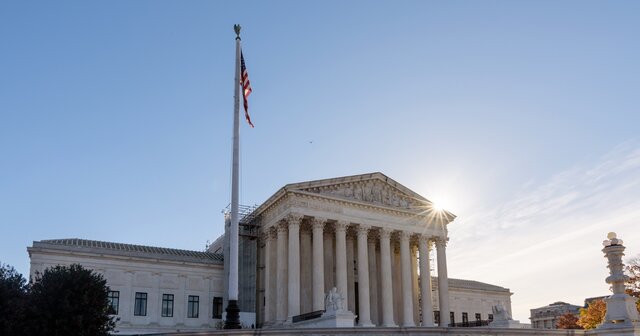
 By Derk Wilcox
By Derk Wilcox
Lawyers in most states have to be members of a mandatory “integrated” bar association before they can practice law. These associations charge annual dues in the hundreds of dollars. Failure to pay means an attorney can’t practice law.
State bar associations perform oversight for the legal profession, usually at the direction of the states’ supreme courts, policing ethics violations, admitting lawyers, and maintaining education standards. But these associations also frequently embrace political positions.
The Oregon Bar Association has published official remarks condemning President Trump: “President Donald Trump, as the leader of our nation, has himself catered to this white nationalist movement, allowing it to make up the base of his support and providing it a false sense of legitimacy. He has allowed this dangerous movement of racism to gain momentum, and we believe this is allowing these extremist ideas to be held up as part of the mainstream, when they are not… [He] said that the white supremacists marching in Charlottesville, [Virginia] in August of 2017 were ‘very fine people.’”
Several Oregon lawyers objected to the factual basis of these claims. More importantly, they objected to being forced to associate with and pay dues to an organization that spends those dues promulgating this type of speech. The U.S. Supreme Court is considering their case, Crowe v. State Bar of Oregon, which challenges this violation of their First Amendment rights.
The requirement that lawyers be forced to associate with a mandatory integrated bar and have their dues pay for political positions has long been contentious. The Supreme Court ruled in its 1990 Keller v. State Bar of California decision that such forced support for speech was allowable as long as the speech was “germane” to the legal profession. That is, lawyers could be forced to pay for speech that affected them directly in their profession, but not on issues that were further afield — like gun control or nuclear disarmament. But this has always been difficult to determine and has never sat well with many lawyers.
To make matters worse, the Keller case’s reasoning was based on a 1977 case, out of Michigan, which dealt with public-sector unions — Abood v. Detroit Board of Education. The Keller court said that since Abood allowed public-sector unions to force employees to associate with and fund the speech of unions — and that this did not violate First Amendment free speech rights — bar associations could similarly require lawyers to join and fund bar associations.
But the Supreme Court overruled Abood in Janus v AFSCME. In that 2018 case, the high court ruled that forcing public sector workers to pay unions to speak on their behalf about matters of public concern violated their free speech rights. So if Abood is no longer valid law, and Keller relied on Abood, where does that leave lawyers? Lawyers in many states — including the Mackinac Center Legal Foundation here in Michigan — have challenged this continuing violation of their First Amendment rights.
So far all the recent challenges have come to naught. Lower courts have all held that it is not enough that the Supreme Court overruled the precedent that sustained Keller. According to this argument, only the Supreme Court can overrule Keller, and it has not yet done so directly.
But this most recent challenge out of Oregon may be the case that finally gets the Supreme Court’s attention. The Mackinac Center Legal Foundation has filed a friend-of-the-court brief supporting the Oregon lawyers who are trying to overturn Keller. The Mackinac Center’s brief shows that even though a majority of states have mandatory-membership bar associations, a majority of lawyers live in states that do not require membership in these “integrated” bars. Instead, they have a voluntary bar association that only serves to regulate the profession. Mackinac shows that since a majority of lawyers practice in voluntary bar states, it cannot be said that regulation of the legal profession requires membership in mandatory integrated bar associations. If some of the most populous states, including California and New York, can regulate the legal profession without forcing lawyers to join and pay mandatory integrated bars, then there is no reason for states like Michigan and Oregon to force lawyers to join and pay.
Bar associations wield significant power. They speak and lobby on behalf of the legal profession and therefore carry a force beyond what individual lawyers can counter. In many states they control the appointment of judges. When bar associations lobby, legislatures are more apt to listen. And, increasingly, bar associations are interjecting themselves into controversial areas for which there is no consensus among the legal profession. Membership in one or more bar associations ought to be voluntary as a check on the power of the bar. If a bar association takes a public position, it is the First Amendment right of lawyers to disavow the group and not be required to fund it.
Permission to reprint this blog post in whole or in part is hereby granted, provided that the author (or authors) and the Mackinac Center for Public Policy are properly cited.
Get insightful commentary and the most reliable research on Michigan issues sent straight to your inbox.

The Mackinac Center for Public Policy is a nonprofit research and educational institute that advances the principles of free markets and limited government. Through our research and education programs, we challenge government overreach and advocate for a free-market approach to public policy that frees people to realize their potential and dreams.
Please consider contributing to our work to advance a freer and more prosperous state.

Donate | About | Blog | Pressroom | Publications | Careers | Site Map | Email Signup | Contact